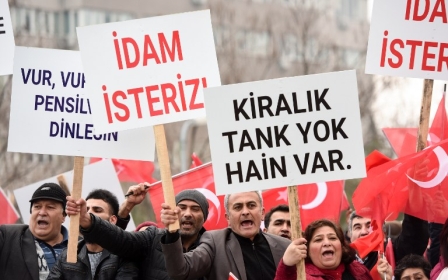Putin congratulates Erdogan on disputed Turkey poll

Russian President Vladimir Putin has called his Turkish counterpart Recep Tayyip Erdogan and congratulated him for winning the referendum, Turkish presidential sources said on Tuesday.
The two leaders discussed ramping up efforts to normalise ties and highlighted the importance of working together to strengthen the ceasefire in Syria.
It followed a similar call from US President Donald Trump.
The White House said they also discussed a US missile strike in Syria and the fight against the Islamic State group.
Trump's congratulations on Monday were in contrast with EU leaders who have been reserved in their reaction to the narrow victory and even his own State Department, which earlier noted concerns expressed by international observers over the "uneven playing field".
Returning in triumph to his presidential palace in Ankara, Erdogan angrily rejected the criticism, telling the monitors: "Know your place."
The referendum was seen as crucial not just for shaping Turkey's political system but also the future strategic direction of a nation that has been a NATO member since 1952 and a European Union hopeful for half a century.
Showing no sign of pulling his punches, Erdogan said Turkey could hold further referendums on its EU bid and re-introducing the death penalty.
The "Yes" camp won 51.41 percent in Sunday's referendum, according to complete results released by election authorities.
But the opposition immediately cried foul, claiming a clean vote would have made a difference of several percentage points and handed them victory.
The main opposition Republican People's Party (CHP) and the pro-Kurdish People's Democratic Party (HDP) said they would challenge the results from most ballot boxes due to alleged violations.
"There is only one decision to ease the situation in the context of the law - the Supreme Election Board (YSK) should annul the vote," the Dogan news agency quoted CHP deputy leader Bulent Tezcan as saying.
The referendum has no "democratic legitimacy", HDP spokesman and lawmaker Osman Baydemir told reporters in Ankara.
There were protests in Istanbul with a few thousand people crowding the anti-Erdogan Besiktas and Kadikoy districts, blowing whistles and chanting, "We are shoulder to shoulder against fascism."
'Unlevel playing field'
The opposition had already complained of an unfair campaign that saw the "Yes" backers swamp the airwaves and use billboards across the country in a saturation advertising campaign.
International observers agreed the campaign was conducted on an "unlevel playing field" and that the vote count itself was marred by procedural changes that removed key safeguards.
"The legal framework... remained inadequate for the holding of a genuinely democratic referendum," the OSCE Office for Democratic Institutions and Human Rights (ODIHR) and the Parliamentary Assembly of the Council of Europe (PACE) monitors said in a statement.
The Turkish opposition was particularly incensed by a decision by the YSK to allow voting papers without official stamps to be counted, which they said opened the way for fraud.
"Late changes in counting procedures removed an important safeguard," said Cezar Florin Preda, head of the PACE delegation.
But Erdogan said Turkey had no intention of paying any attention to the monitors' report.
He added: "This country held the most democratic polls that have never been seen in any other country in the West."
Stay informed with MEE's newsletters
Sign up to get the latest alerts, insights and analysis, starting with Turkey Unpacked
Middle East Eye delivers independent and unrivalled coverage and analysis of the Middle East, North Africa and beyond. To learn more about republishing this content and the associated fees, please fill out this form. More about MEE can be found here.




